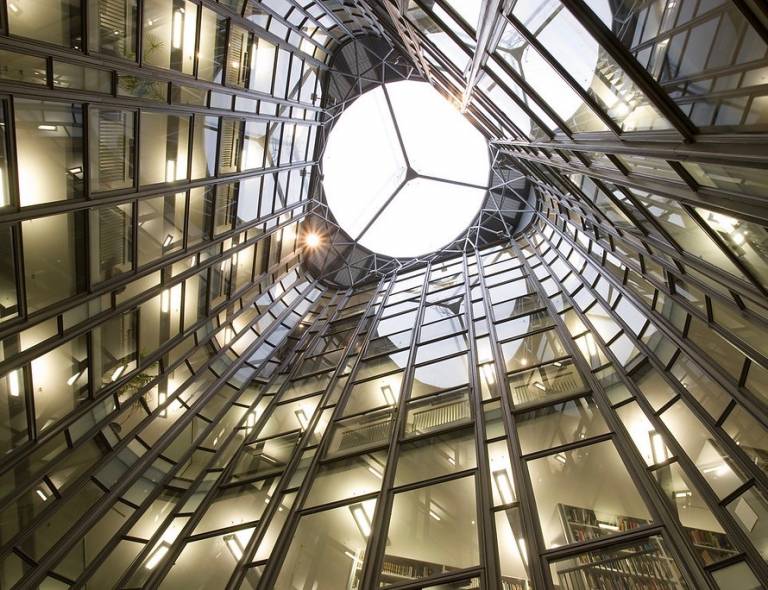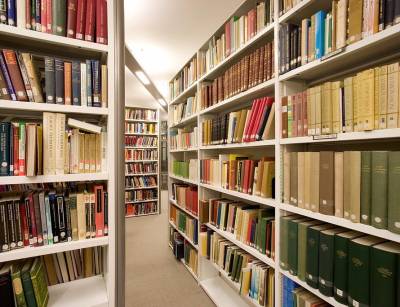Library of the month: School of Slavonic and East European Studies library
21 November 2017
From myUCL Student Journalist Robert Vilkelis Do you like the sound of a lifelong community? How about one-of-a-kind letters from the pens of historical leaders? If this has you leaning forward, you might soon find yourself setting foot inside the library of the
 ucl.ac.uk/ssees/library" target="_self">School of Slavonic and East European Studies (SSEES).
ucl.ac.uk/ssees/library" target="_self">School of Slavonic and East European Studies (SSEES).Join Head Librarian Lesley Pitman, and let's get to the heart and soul of the home of Slavonic and East European studies.
'The library is the people'
As you admire the black-and-white marble floor and the
cascading glass panes surrounding the interior, it's hard not to be taken
aback.
You might find it difficult not to ask, 'What do you love most about your library?'
'The incredibly international nature of it,' Lesley would say, 'and that isn't just the collections, although the collections have extraordinary range in the countries that they cover.'
So, what else could it be?
'The staff, the scholars, the students, the academics that
all pass through the library. We see people at different points in their
careers; we follow them because of the nature of the subject area.'
Thoughtfully, Lesley adds, 'The library is the people: the
library is a curated and managed collection, and it's people that do that.'
There is a certain energy about the place - and perhaps that's down to more than just eco-friendly architecture.
The living voice of history

Peer past row after row of literature. Shelves practically
dripping with Cyrillic, new and old; a line of the latest news in print, from
Estonian to Serbian; tables of books yellowed and faded, yet rich and vibrant.
What could possibly be this library's greatest treasure?
'Our archive selection,' you hear, 'material that is unique;
therefore priceless'.
'RW Seton-Watson was the founder of the school, and we have
his archive,' Lesley shares, 'It contains all the correspondence with the
political leaders; everybody who was active in politics in the countries that
were arising from the breakup of the Austro-Hungarian Empire.
Come 19 October 1915, Seton-Watson's friend Tomáš Garrigue Masaryk, later the first President of Czechoslovakia, delivered his inaugural talk, 'The Problem of Small Nations in the European Crisis' for the School's opening address.
Masaryk never could've expected that 90 years later, President Václav Klaus of the Czech Republic would be delivering a talk of the same name to inaugurate SSEES's new home along Taviton Street.
The Library is a quiet place for contemplative studying - yet the living voice of history echoes proudly within its walls.
A favourite - to Russia, with love
With so much to see within the SSEES archives, it's good to have a place to start.
'It's a scrapbook of Lt. General Wolfe-Murray; a record from
beginning to end of a British parliamentary delegation to Russia in 1913,
before the revolution.'
From the initial invitation to the final goodbye, it's a record of everyday objects - like luggage tags and dinner menus - that most would usually leave behind, and priceless private invitations and photographs you'd see nowhere else. Then, if you recall the display to the right when you enter the building, it turns out that's also a gift of Fabergé silver from a 1909 Russian parliamentary delegation!
No matter where you start within SSEES, there's no doubt that you'll leave knowing more than what you came for.
'It's easier to ask, what don't you cover?'
The more you walk around the Library, the more you realise how it's deeper than you might expect, with more study spaces than you might think - 170, to be exact.
It's tempting to ask, 'What's your favourite collection?' As
chance would have it, you get a one-of-a-kind recommendation.
What else might you find surprising about the Library?
'There was a huge surge of area studies in the US following
the Second World War. We predate that.'
Yet, there's more, as Lesley describes, 'when asked, 'What do you cover?' I say it's easier to ask, 'What don't you cover?'
'The subjects that we cover can really be anything, even beyond the humanities and social sciences. The only ones we wouldn't collect on are pure sciences and medicine.'
Legendary Hungarian poetry? No problem. Finnish academic
journals? Check the rolling shelves downstairs. Macedonian economic
commentaries? Go ahead. Bulgarian medical practices in the mid-20th century?
You can probably find that too, so long as it's a review.
SSEES was an early innovator in its field - and what you'll find here will not only meet, but exceed expectations.
Come and stop by!
There are 19 libraries underpinning the UCL experience. Whether you've been at UCL a few months, a few years or a few decades, there's always a moment to stop and admire something you never stopped to admire before - the same goes for you if even if you're a seasoned SSEES'er.
Next time you're strolling through Gordon Square, walking down Taviton Street, or even have your head down in a laptop or book within the space, take a moment to experience the SSEES Library through the lens of its rich and vibrant grandeur.
 Close
Close

